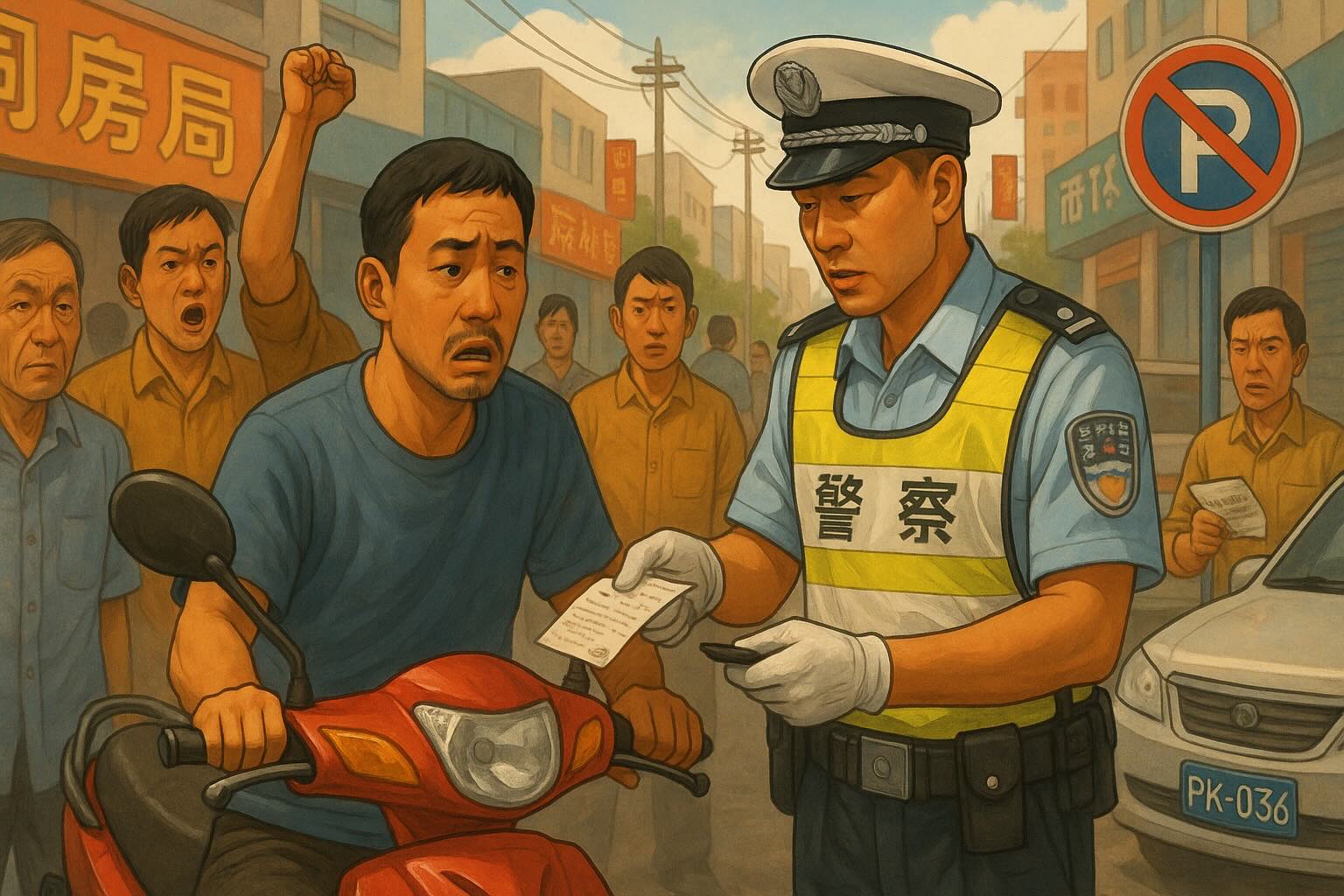China’s slowing economy fuels surge in ‘fine-based law enforcement’, sparking public backlash

In the shadow of China’s much-hyped post-pandemic recovery, an uneasy trend has been quietly gaining momentum on the streets — the aggressive use of fines by local authorities as an alternative revenue stream.
Dubbed "fine-based law enforcement" by critics and commentators alike, this practice has rapidly escalated across Chinese cities, with traffic penalties, minor regulatory infractions, and even obscure administrative violations becoming lucrative targets for cash-strapped local governments.
What was once sporadic has now become systematic, with the Chinese public increasingly frustrated by what many perceive as arbitrary, excessive, and often disproportionate penalties.
Behind this brewing discontent lies a broader economic malaise that Beijing has struggled to mask — an economy grappling with slowing growth, record youth unemployment, weak consumer confidence, and declining property sector activity.
The surge in fines reflects not only tightening fiscal conditions for municipal governments but also deeper structural cracks in China’s economic model, where overreliance on real estate, diminishing export strength, and dwindling tax revenues have left local authorities scrambling for alternative income sources.
From development zones to fine zones
For decades, local governments in China were synonymous with ambitious development projects, industrial parks, and towering residential complexes — all funded through land sales, real estate booms, and generous fiscal transfers.
However, with the property market in prolonged decline, land sales drying up, and the central government limiting new debt issuance, local administrations are under immense pressure to balance their books.
Fine-based law enforcement has, in many regions, emerged as a convenient fiscal stopgap.
Social media platforms like Weibo and Douyin are flooded with videos of drivers being fined for trivial or previously unenforced violations — ranging from parking infractions to obscure traffic signage breaches.
Vendors have reported heightened crackdowns over minor licensing irregularities, while citizens recount being slapped with fines for jaywalking in areas where crosswalks are either poorly marked or non-existent.
This isn't happening in isolation.
Across cities like Xi’an, Nanjing, and Chengdu, reports indicate record surges in revenue collected from fines and administrative penalties over the past year.
In some jurisdictions, local authorities have openly acknowledged intensified enforcement efforts, citing “urban management” and “public order” — thinly veiled euphemisms, critics argue, for revenue-generation tactics.
Mounting evidence of fiscal distress
The timing of this trend coincides with mounting evidence of local government fiscal distress.
Provincial and city-level governments are grappling with ballooning debt loads, estimated at over $9 trillion, largely accumulated through opaque financing vehicles and off-balance-sheet borrowing.
With Beijing tightening scrutiny over local debt and cracking down on speculative property development — once a cornerstone of municipal revenue — the options for plugging fiscal holes have dwindled.
According to data from the Ministry of Finance, land sales revenue — historically contributing over 30% of local government income — plummeted nearly 20% in 2023.
Meanwhile, central government transfers, although substantial, are increasingly earmarked for specific programmes like poverty alleviation or pandemic recovery, leaving little room for discretionary spending.
Caught between rising costs for social services, public sector salaries, and infrastructure maintenance, local officials are increasingly resorting to alternative revenue streams.
Fines, fees, and administrative penalties have thus become an expedient tool — easily implemented, legally justified, and difficult for citizens to contest, especially within a system where judicial oversight remains limited and appeals processes are opaque.
Public backlash brews
Yet, the social consequences of fine-based law enforcement are becoming impossible to ignore.
Citizens, already grappling with economic uncertainty, stagnant wages, and high living costs, now face an additional financial burden in the form of mounting fines.
In many urban centres, residents complain that enforcement appears selectively aggressive during fiscal crunch periods, only to taper off once revenue targets are met — reinforcing perceptions that fines are more about fiscal desperation than public safety.
Online, hashtags like #FinesAsRevenue and #LocalFiscalCrisis routinely trend, with viral posts highlighting examples of disproportionate penalties.
One video from Shenzhen showed a delivery driver fined multiple times within a single block for minor violations, sparking outrage over the targeting of low-income workers already struggling to make ends meet.
The phenomenon has even drawn criticism from establishment voices.
In April, Caixin, one of China’s leading financial publications, published an editorial warning that overzealous fine-based enforcement risks eroding public trust and exacerbating social tensions.
“The rule of law must not be reduced to a fiscal instrument,” the article declared, cautioning that such practices could backfire by fuelling resentment and undermining local governance credibility.
A broader economic picture
China’s economic slowdown provides the inescapable backdrop to this unfolding dynamic.
GDP growth, once consistently above 7%, has slowed markedly, with many economists projecting expansion of around 4.5% for 2024 — below Beijing’s official target and insufficient to meaningfully reduce unemployment or reinvigorate domestic consumption.
The property sector, long the bedrock of China’s growth and local government finances, remains mired in crisis, with major developers like Evergrande and Country Garden battling defaults, unfinished projects, and plummeting homebuyer confidence.
Export growth, another pillar of economic resilience, faces headwinds from global protectionism, geopolitical tensions, and supply chain realignments.
This cocktail of structural weaknesses has left policymakers with limited options.
The central government, wary of reigniting speculative bubbles or worsening local debt, has resisted large-scale stimulus. Meanwhile, municipal governments find themselves squeezed, facing both growing fiscal obligations and shrinking revenue streams.
It is within this economic squeeze that fine-based law enforcement has flourished — a symptom, critics argue, of both short-term fiscal pressures and long-term structural imbalances in China’s governance model.
Signals of policy tension
For Beijing, the proliferation of aggressive fine collection represents a delicate balancing act.
On one hand, the central government is under pressure to maintain macroeconomic stability and avoid local defaults.
On the other, it must grapple with the risk that increasingly visible and unpopular enforcement measures could fuel social unrest or further dampen consumer sentiment.
Already, there are signs of internal policy tension.
While some provincial governments have defended their enforcement tactics as necessary, others have quietly acknowledged public discontent and pledged to “standardise” fine practices.
State media coverage, though limited, has begun to spotlight egregious cases, suggesting growing central awareness of the potential fallout.
Nevertheless, the fine-based law enforcement surge shows few signs of abating, especially as local governments confront daunting fiscal realities.
With no quick fix to China’s property woes, sluggish growth forecasts, and limited fiscal firepower from Beijing, the temptation for municipalities to squeeze citizens for every possible yuan remains high.
An uneasy new normal
For millions of Chinese residents, the consequences of this trend are increasingly tangible.
Whether commuting to work, running a small business, or navigating urban streets, the spectre of fines — often sudden, opaque, and difficult to challenge — has become part of daily life.
As China’s economy struggles to regain momentum and local governments scramble to stay solvent, fine-based law enforcement may well become an uneasy new normal.
But with public patience wearing thin, and social media amplifying each viral incident, the strategy carries risks that go far beyond the balance sheets of struggling municipalities.




![From Kathmandu to the World: How Excel Students Are Winning Big [Admission Open]](https://nepalaaja.com/img/70194/medium/excel-college-info-eng-nep-2342.jpg)
